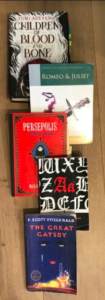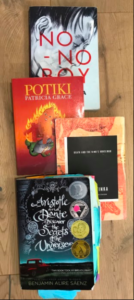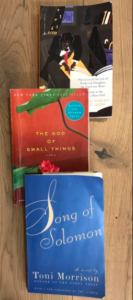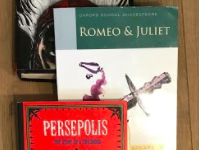English 1, 2 and 3 are classes taken by all Lick students. The reading material for these courses sometimes varies, but for the most part, in each of these grades all students in that grade read and discuss the same books. In English 4 students choose between different subject-focused seminars and so the texts consumer 12th graders vary tremendously.
At the end of this year, I began thinking about the many books I have read and shared with my classmates over the past three years. I decided to rank them. My choices probably say as much about me as they do about the books. Here is my list of 14, from least favorite (14) to most favorite (1).
14. Children of Blood and Bone (Tomi Adeyemi, 2018) One of the first (and only) things that I learned about writing in fourth grade was ‘show not tell.’ Unfortunately, this novel ignores that convention, as a solid half of it spells out exactly how each character feels (either happy, sad, or angry) at every moment. Although the novel bravely addresses issues of discrimination and prejudice, which I admire, I don’t find the story satisfying. Adeyemi uses the Percy Jackson model, but fails to fully develop her fantasy world. Moreover, her characters, all of whom repeat the same internal conflict over and over, are not compelling. I love children’s fantasy, and it still took immense physical effort and willpower to turn each page of the 500 plus page book. I realize that it is written from the point of view of a different culture with which I have no experience, but I just don’t think that it is good storytelling.
13. Stealing Buddha’s Dinner (Bich Minh Nguyen, 2007) While it was thoughtful and well written, the decision to structure this memoir as a number of separate stories made Stealing Buddha’s Dinner hard to enjoy. None of these vignettes was particularly gripping, and they muddled the overall story arc. A disappointing start to Lick-Wilmerding English, nothing about this book felt particularly bookworthy to me.
12. Romeo and Juliet (William Shakespeare, 1597) I am fine with complex language in literature — it forces me to make deeper connections and think in different ways. However, for me, Shakespere’s Elizabethan English is so hard to follow that it subtracts from a story that might otherwise be interesting. I would prefer to see Romeo and Juliet as a stage production, than read it as a book. Plus, all the characters make such horrible decisions.
11. Persepolis (Marjane Satrapi, 2000) I am embarrassed to admit how confused I was by this book. Persepolis is a very exciting and human story nestled in a web of historical references. Unfortunately, I didn’t get the historical references. I think that anybody who reads this graphic novel needs to prepare themselves with a thorough understanding of Iranian history.

10. The Scarlet Letter (Nathaniel Hawthorne, 1850) It may have been revolutionary literature at the time, and Hawthorne may have been boldly challenging how an authoritarian patriarchal theocracy suppresses creativity and difference and mistreats ‘the other’(particularly women), but I struggled to absorb Hawthorne’s The Scarlet Letter. The characters were more symbolic than realistic, the plot was too far removed from anything I have ever experienced, and the book reads like a convoluted stream of consciousness.
Nevertheless, Hawthorne’s message about psychological manipulation was interesting, and it translates well from the 17th century (when it is set) to the 19th when it was written to the 21st.
9. The Great Gatsby (F. Scott Fitzgerald, 1925) Some consider The Great Gatsby a perfect novel, but I did not enjoy it. I had a hard time having sympathy, much less empathy, for any of the distasteful characters who spent the entire book bickering.
8. No No Boy (John Okada, 1957) This new addition to Lick’s reading repertoire may have been a tad slow due to the protagonist’s trauma, but it presented a thought-provoking perspective on a period of American history (the Internment of Japanese Americans during WWII) that I knew very little about. The book, which was published in 1957, is especially relevant now with the U.S.’s internment of immigrants from Latin America and elsewhere.
7. Potiki (Patricia Grace, 1986) The language of Potiki is simple but unfocused, so it is often hard to tell exactly what Grace is referring to. The narration, which feels eerily birds eye view, furthers this sense of mystery and confusion. Nevertheless, there is no shortage of intriguing story telling and ‘juicy’ imagery ranging from giant monster fish to statues having children. I enjoyed analyzing Potiki almost as much as I enjoyed laughing about it. It is simultaneously whacky and serious, and while it sometimes felt as if we were reading too deeply into Grace’s unconventional writing style, it was definitely worth it.
6. Death and the King’s Horseman (Wole Soyinka, 1975) Death and the King’s Horseman presents an ethical dilemma which really made me think. Soyinka approaches the themes of identity and purpose in a unique way. However, I was annoyed by the author’s note, which warned the reader how not to interpret the book (I learned that once you publish a book, you don’t get a say in how it is read).

5. Aristotle and Dante Discover the Secrets of the Universe (Benjamin Alire Sáenz, 2012) Aristotle and Dante is not exactly what I would consider an English class book—it was more of a young adult romance— but I enjoyed it. I sympathized with the characters and was moved by their journey.
4. Their Eyes Were Watching God (Zora Neale Hurston, 1937) Just when you think you understand Their Eyes Were Watching God, a shift in the plot forces you to rethink everything. A challenging but solid end to freshman year English.
3. The Life of Frederick Douglass (Frederick Douglass, 1845) I was expecting The Life of Frederick Douglass to read like a history textbook, but I was completely wrong. The book may be packed with information, but that information is skillfully woven into a compelling story, which makes it both digestible and enjoyable. The language is old-fashioned, but also clear and understandable. Viewing Douglass’ expirience of slavery in its entirety—both the horrible moments and the hopeful ones—offers something that the brief journal excerpts and textbook passages that we read in history cannot.
2. The God of Small Things (Arundhati Roy, 1997) The God of Small Things—with its time jumps and child speak—is extremely difficult to read and understand. However, if there is any book that transports you into another world, it’s this one. Most of the book is written from a child’s perspective, so it mainly consists of stuff that a child would notice: incredible detail, familiar places and people, obscure snippets of memory, questions, emotions, worries—the kind of stuff that humans, on a deeper level, connect with, and therefore
makes a world come to life. It may be tough, even infuriating at times, but The God of Small Things rewards you for your attention with seemingly endless details hidden in its pages.

1. Song of Solomon (Toni Morrison, 1977) Each of Song Of Solomon’s 337 pages could be fruitfully discussed and dissected for an entire class. At the same time, the book can be enjoyed with zero analysis whatsoever. What makes this book stand out is that the plot, which often borders on fantasy, nevertheless feels spontaneous and real. Morrison weaves together a web of ideas which build and expand upon each other, but which never once repeat. As a reader, your view of different characters and situations is constantly evolving and shifting, just as it would in real life. It feels as if you are exploring and learning along with Milkman; as he comes of age, his widening perspective prompts the reader to notice new details from both past and present as well. By the end, you could almost call this book, this literature book, a page turner, almost.







